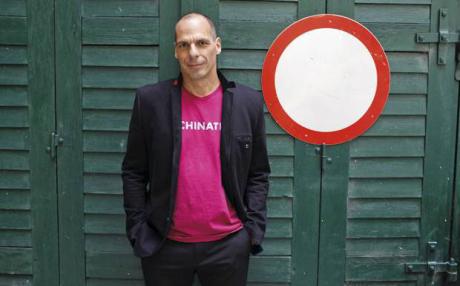Andrew Curry writes: In yesterday’s post I looked at the short-run issues about Syriza’s stand-off with Germany and the Eurozone. In this post, I’m going to look at the wider economic issues.
Greece is a tiny economy, and its problems are a hill of beans compared to the problems of a stagnating Eurozone which is teetering into deflation. President Obama and the Bank of England Governor Mark Carney are not urging a change in Eurozone policy because they have suddenly become radicalised, but because they are concerned about the weakness of the Eurozone as an export market, and the consequences of that for the global economy.
And the whole European project could be jeopardised if it doesn’t create a better economic deal for its citizens – just as the austerity policies of Weimar-era Chancellor Brüning paved the way for the surge in support for Hitler. (And hence the reference to Golden Dawn by Greece’s new Finance Minister Yanis Varoufakis in his news conference with his German counterpart Wolfgang Schäuble.) Certainly the financial markets seem less concerned about Greece and more concerned about the “Japanisation” of Germany – the long-term low-growth/deflationary combination that financial intervention such as the ECB’s quantitative easing programme is unlikely to shift.
So Germany needs to find a way to re-start the European economy, and it will continue to get political and diplomatic pressure from its allies until it does so. That’s one of the reasons why Syriza’s election was fairly warmly received in many parts of Europe. But it wants to do it in a way that doesn’t encourage anti-austerity parties in other parts of the Eurozone’s periphery. Whatever it does, it has to make sure that it doesn’t lose face.
In other words, the game doesn’t stack up. But just to make it more complex, there seems to be no straightforward way to get a country to leave the Eurozone – even if they don’t comply with the terms of membership. When you look at this complexity, you can see why Yanis Varoufakis wrote, at the time of Greece’s 2012 elections, that
starting the ball rolling in the right direction [on debt] requires a government in Athens that is capable of looking our German partners in the eye and not blinking for a few minutes.
In other words, this might be just the right moment for Greece to have a finance minister who understands both economics and game theory.
Economics not morals
In short, then, Germany has since the financial crisis protected the interests of Europe’s financial sector (and the German financial sector), at the expense of the interests of the European economy (and the Germany economy). To some extent the election of Syriza has brought this political and economic problem into sharp relief.
One way of understanding this aspect of the issue is by looking at Germany’s labour productivity growth since 1998, data from the OECD via the Financial Times. It’s at the bottom end of the OECD class: even behind Greece.
In his excellent essay on the Eurozone crisis, Michael Pettis has this to say:
[I]f you separate those who benefitted the most from European policies before the crisis from those who befitted the least, … it might be far more accurate to posit a conflict between the business and financial elite on one side (along with EU officials) and workers and middle class savers on the other. This is a conflict among economic groups, in other words, and not a national conflict.
And this rather stark conflict is hidden by the discourse about the crisis. As my colleague Joe Ballantyne pointed out to me, in northern Europe, the discourse presents this as a moral issue between nations, not an economic issue (the winners in economic systems often see it this way). It isn’t a useful lens. When I studied economics, we were directed to a well-known footnote in our textbook by R.G. Lipsey which noted that “bygones are bygones” – in economics, poker, war and also love. Indeed (West) Germany benefited from just such a pragmatic approach in 1953 when half of its external debt was written off and repayment of the rest delayed by decades.
When Matthew Lynn and I wrote the Future Perspective on the Eurozone in 2012 – which, it turns out, is still a good guide – we weren’t sure if the Eurozone would hold. A few months later, the ECB’s Mario Draghi said the central bank would do “whatever it takes” to preserve the Euro. We’re at another crisis moment. But this time we’ve moved from the financial crisis to the political crisis. Political crises are always more dangerous.
Part 1 of this post is here. The picture at the top of this post of Yanis Varoufakis is used courtesy of Open Democracy, whose profile of the Greek Finance Minister is recommended.
The post Playing poker in the Eurozone [2/2] appeared first on futures blog.
SOURCE: futures blog – Read entire story here.


